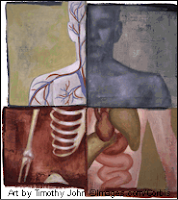 During the last few years, there's been a good amount of ethical debate over the fairness of Web sites like MatchingDonors, which match living organ donors with patients who need organ transplants. Functioning much like online dating sites, these Web sites bypass the objective mathematical formula that allocates organs from deceased donors to those who need them most and instead allows patients to solicit living donors—often called "Good Samaritan" donors—through personal appeals posted online. As a result, some ethicists worry that a donor's decision to give an organ to a specific person may be based more on the strength of a certain appeal and less on information relevant to the outcome of the transplant. And they worry that when donors get to choose who they give an organ to, they're also, in a sense, able to decide who lives or dies based on particular preferences, including race or religion.
During the last few years, there's been a good amount of ethical debate over the fairness of Web sites like MatchingDonors, which match living organ donors with patients who need organ transplants. Functioning much like online dating sites, these Web sites bypass the objective mathematical formula that allocates organs from deceased donors to those who need them most and instead allows patients to solicit living donors—often called "Good Samaritan" donors—through personal appeals posted online. As a result, some ethicists worry that a donor's decision to give an organ to a specific person may be based more on the strength of a certain appeal and less on information relevant to the outcome of the transplant. And they worry that when donors get to choose who they give an organ to, they're also, in a sense, able to decide who lives or dies based on particular preferences, including race or religion.
In a new study published in Clinical Transplantation, researchers looked at the profiles of patients soliciting living kidney donors on the largest organ matching Web site in the United States. They found that the proportion of patients who are white and employed is higher than among the general population of those waiting for organs. They also found that other than listing their blood type, the region where they live, and their gender, patients provided surprisingly few socio-demographic and medical details in their profiles. The assumption is that patients may omit certain personal and medical characteristics in their profiles for a variety of reasons—maybe they don't think their marital status is relevant or they worry that their age or race will contribute to bias or discrimination. "It is not surprising that patients will present themselves in the most favorable light while omitting characteristics that they perceive as undesirable, as to do otherwise might reduce their success in attracting a suitable living donor," says psychologist James Rodrigue, co-author of the study. "However, the transplant community has worked diligently for years to ensure that social worth and bias are removed or otherwise minimized from patient selection decisions, yet we passively accept such social worth judgments by Good Samaritan donors in the context of public solicitation."
While the online system does not violate existing national policies with regard to organ donation, many are concerned that organ matching Web sites favor those who have greater education and wealth. And in a 2003 telephone survey conducted by Transplantation magazine, two-thirds of respondents said that didn't like the idea of anonymous kidney donors directing their organs to a member of a specific religious or racial group, or to a specific person with whom the donors have no prior emotional connection. —Heather Wax
Tuesday, October 21, 2008
Ethical Concerns Over Organ Donation Sites
Posted by Heather Wax at 7:17 AM
Labels: Technology
Subscribe to:
Post Comments (Atom)



0 comments:
Post a Comment